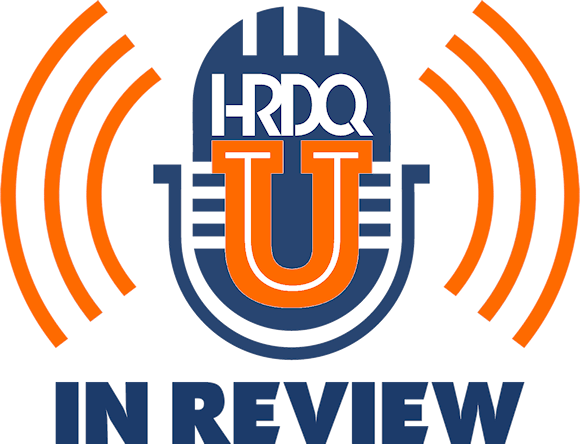
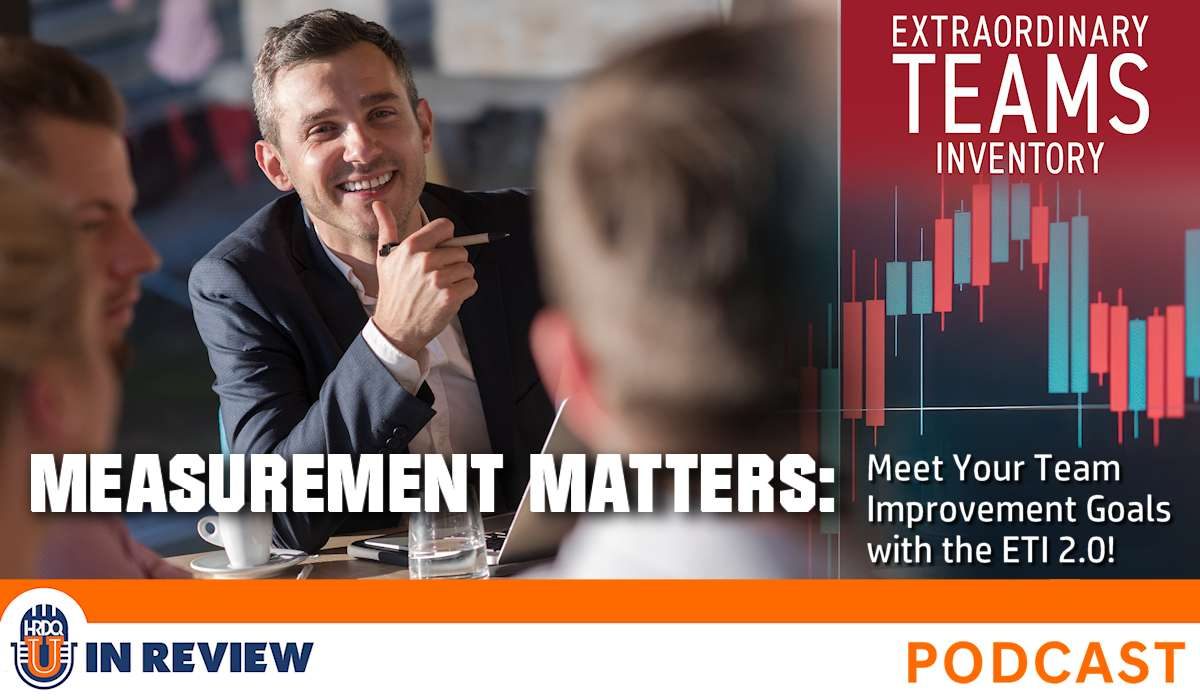
We’re joined by Kevin Coray and Sally Stamp to dive deeper into our recent webinar, Measurement Matters: Meet Your Team Improvement Goals with the ETI 2.0!
If you’re looking for a way to assess, measure, and enhance your team’s effectiveness, this episode is for you! We’ll break down
Resources and Links:
Watch the webinar: Measurement Matters: Meet Your Team Improvement Goals with the ETI 2.0!
Learn more about the product: Extraordinary Teams Inventory 2.0
Get Certified: ETI Certification
Check out the related blog post: “Elevate Your Team with the ETI: A Team Performance Assessment“
00:00
Welcome to this week’s episode of the HRDQ-U In Review podcast, where we bring you the latest insights and practical tools for enhancing soft skills training in your organization. This podcast is brought to you by HRDQU.com, and I’m your host, Sarah, Learning Events Manager at HRDQ-U. Today I have Kevin Gray and Sally Stamp joining me to discuss the webinar, Measurement Matters: Meet Your Team Improvement Goals with the ETI 2.0. Kevin, Sally, thank you both for joining me today.
00:29
Thank you. Thanks for having us. And I would love for you guys to start off by just sharing a little bit about who you each are and what you guys do.
00:41
Kevin’s pointing at me since I’m the extrovert and we’ll go first. So basically, I’ll work backwards a little bit. I’ve been spending the last years doing primarily coaching and in the team coaching domain. Prior to that, I did consulting much of the time in the healthcare world because my original education and training is in nursing and hospital administration.
01:08
And luckily I’ve been able to combine all of the experiences that I’ve had. And now, as I said, really focus on coaching, which is different from consulting, because in coaching, it’s all about the client having the answers as opposed to the consultant, me coming in and telling them what to do. So it’s a good fit. And I enjoy working with colleagues and friends like Kevin, and he’ll tell you a little bit about himself. Hi. So I’m an industrial and organizational psychologist.
01:37
My early work was on Teams, on the team effectiveness, and hundreds of thousands of people took an instrument that I co-authored that was used in the federal government extensively. And that had some relationship to the extraordinary Teams inventory, which is what we’re going to talk about today.
02:03
I’m also a master somatic coach and I ran a consulting firm in the mostly in the not-for-profit and public sector for 26 years. And so I’ve had a lot of experience with many, many, many organizations over that period of time. Well, thank you both for sharing out, giving us a little bit of insight and to yourselves there. And so let’s get into it. Kevin, can you start us off just by sharing what is the ETI? Yeah. The extraordinary teams inventory is a
02:32
is a 60 question survey that’s online hosted by HRDQ. And it is an instrument that was designed to look at the extent to which any particular team that decides to take the instrument measures up to organizations that were studied by Jeff Belmont and Kathy Ryan and deemed to be truly extraordinary.
03:03
So any team that takes the assessment can take a look at it and see where they stand relative to the norm base against all the other teams that have taken the instrument and get a really useful profile that helps them think about and discuss what areas they’d like to improve and move forward on.
03:26
And just this week, we did the webinar together on measurement matters, meet your team improvement goals with the ETI 2.0. We had a really engaged audience with us. Could you share what some of the key takeaways were for our registrants at this event? Well, I’ll jump in here. Really, we began with what Kevin just described, and that is talked a little bit about what the tool is and what it measures and why it’s important.
03:56
for a team to measure their success. So beyond that though, we helped participants really take away not only an understanding of the instrument, but what the report looks like. We got into the detail of what they would use with a team that they work with. We talked about how they would work with a team, with a team leader and the team members. And we really did more than just a product demonstration. We looked at ways to use it in your own individual
04:26
internal coaching consulting work or as an external. And we’re hoping that again, people came away seeing this as an incredibly sound instrument to use that’s also easy to administer and relatively cost effective. And as Kevin said, it really is one of the few that measures the team, not the individual team members. So again, hopefully people took that away and we’ll be getting lots of people who want to use the tool.
04:55
moving forward. And Sally, could you elaborate a little bit more about the extraordinary teams model? Yes, Kevin mentioned that this really is based on the work of Kathleen Ryan and Jeff Bellman, who wrote a book. I think it was now published in 2009. And this was after a couple of years of field research with groups and teams who self identified as extraordinary. And in the
05:24
many, many interviews with the individual team members and some teams, they discovered that there were elements that were consistent in terms of teams that had that experience. From that qualitative study, they really did look at depicting these elements in a way that people could look at and assess themselves, and also looked at an underlying piece of teaming.
05:53
which we’ve now called the aspirations. And this actually, the model includes looking at what they described as group needs. What is it that we all come to a team wanting to experience, the team or a group? So the model then led to Kevin getting involved to design the instrument so that aspects of their research could be measured. So that was a lot of words. And Kevin, do you want to add to that?
06:23
No, I think that’s great. Sally. And Kevin, could you go into the details of the key aspects of the ETI report? Yeah, as Sally said, Bellman and Ryan identified a number of practices which are behaviors that happen in extraordinary teams. And those behaviors fell into certain categories.
06:50
And those categories are now measured by the extraordinary teams inventory. And there are 10 practices that we’ve defined and are measured by the extraordinary teams inventory. the primary ones that define what an extraordinary team is are outstanding results and the fact that people that are in extraordinary teams experience personal transformation.
07:19
These teams are really more than high performance teams. They’re teams where one employee is in the team or a team member is present. They want to be in that team for a long time. There’s a lot of loyalty. There’s little turnover. People are really excited by the team. They remember their experiences in this team for the rest of their career as a high point experience.
07:46
And this personal transformation is just really an important aspect of it. But then there are eight other particular practices that were observed by Bellman and Ryan and which are measured in the ATI. So those include things like compelling purpose, embracing difference, genuine curiosity, adaptive ability to adapt to
08:16
structure in the team so that there’s not too much or not too little structure. Shared leadership, great meetings and others and others can people could watch the webinar and get the whole download if they’re interested. And I wanted to just add Kevin to what you said that you mentioned a high point team experience and for anybody who’s listening to this podcast
08:42
That’s an exercise we did in the webinar and that we would invite you to do with the team that you’re working with, which is think about a time where you had the kind of experience Kevin described and then share what were some words to describe that. And consistently we find that what people have experienced was confirmed in the research that underlies the ETI. And is measured in the ETI. Yes. One other thing I’d say about the ETI is that it’s a
09:11
a tremendously sophisticated instrument from a perspective of its statistical quality. So it has really good high level psychometric sophistication and that leads to diagnostic sensitivity. So each team’s profile is presented in the report in the ETI and the profile is kind of like a fingerprint. It’s a way for people to see what’s going on in the team and brings forward the opportunity to get on the table.
09:41
Lots of important matters for the team to discuss these 10 practices. And it’s, know, when I say diagnostic sensitivity, it’s kind of like what a doctor would do when you go in and present with some symptoms. And then the doctor does a variety of tests to figure out what you have. Is it COVID? Is it the flu? Is it the cold? You know, what is going on? It takes a number of tests to figure it out. And so the ETI is a similarly diagnostically sensitive instrument.
10:12
that can look at the dynamics of a team and really do a great job. You can take to the bank the results that come forward from the ETI. Yes. And if you’d like to learn more about that and hear more on this, make sure that you watch the webinar. I’ll have all that information linked below where they go into further detail. And Sally, what situations would you say are most amendable to using the ETI? So that’s a question that
10:41
we often get. And really, there are so many instances in my experience where I have introduced the ETI to a team I’m working with and then together determine their readiness to use the tool. For years, admittedly, I used the model before the ETI was designed and developed. So I typically encourage people to read the book.
11:11
and then become familiar with the elements of the tool. So a newly forming team can benefit from this to get a baseline of information with relationship to the practices. Already established team, in my experience, really benefits. They’re working together. They have their strengths to some degree already identified. And yet there might be some gaps that this will help them, especially as Kevin said to.
11:39
have some of the conversations they need to have. And clearly, any team that’s experiencing membership changes or changes in terms of their focus or initiatives can benefit from this evaluation, this measurement of how effective their teaming is. So I don’t want to say it’s a one size fits all, but it’s a one size fits most. Kevin, could you share a little bit about who used the ETI? Yeah.
12:10
The ETI database has hundreds of teams in it at this point, growing every day. And those teams are fairly normally distributed. So that what we find in the norm base, as you would expect, is that only around 10 % of teams are really truly extraordinary. And only about 10 % of teams are really ordinary or really have lots of issues that have to be resolved. The majority of teams, over around 80%,
12:39
are in the solid range and solid is a good place. mean, I think most people would say that they are in a team that pretty much functions, that they’re not dysfunctional, they work pretty well, but there are things that could be improved and they have different hopes for what would be different if they could define their future in a certain way. And so those kinds of teams that are in the database are from all over the place. There’s some…
13:09
from international teams, there’s teams, mostly teams from the United States. There teams from the private sector, the public sector, and the not-for-profit sector. Lots and lots of teams from lots of different areas. Lots of teams in education, lots of teams in city and state governments, some in the federal government. There are a lot of teams.
13:38
from universities, lots of teams from just a wide variety of not-for-profits, ones that are big with multi-million dollar kinds of budgets and very small ones with only four or five employees. So it’s just a really interesting set of companies. you can count on having your own team.
14:07
compared to others that in some ways are like yours.
14:13
Sally, how long does it take to get from the initial discussion with the team leader to actually administering the ETI and then debriefing the team on its report? Well, Sarah, that of course depends on the relationship that you have with the client. And in my experience, and I think Kevin probably shares this, it’s typically something that I introduce conceptually in the team coaching. And yet it’s definitely
14:43
collaborative approach to deciding when and how to do this and often other team members are involved in that decision. from the time you begin to talk about it until you actually do the assessment, which typically takes a few weeks to have people complete it and then get it reported out, then the debriefing, you’re looking at several months, by no means a year. So for the most part, it happens pretty quickly. And again, I think part of that is when people realize
15:12
It’s easy to administer, it’s an online assessment, and it’s competitively priced. So for this investment, they’re getting a huge payback for that. And I’ve had people assess more than once. Some teams decide that they want to see how they’re doing once they’ve selected an area of focus. And that can happen. And typically, we encourage them to wait a period of time before they do that. And yet, they’ve done that with
15:41
very exciting results to see the performance and improvement. And what exciting things are the Extraordinary Teams group up to next? Well, good question. I wanted to mention that before Sally comes in and talks about a new product that’s related to the ETI, I just wanted to mention that the Extraordinary Teams inventory also has a series of support materials that are available for
16:12
consultants, coaches, team leaders, in order to make it easy to administer and debrief the teams, or almost by the numbers, you could use the PowerPoint that’s included with the support materials and just lead the team through the important kinds of discussions that are necessary. And the instrument, the report itself includes additional probing questions and suggestions for improvement for each of the areas. And,
16:40
So there are other tools that are available. again, I think you can find out more about that by watching the webinar or going to the HRVQ site. And thank you for that, Kevin. Since that, again, is another, in my experience, differentiating feature of the ETI suite of products, I’m calling it, since you really do get materials to use. And sometimes in terms of how long it takes to get from
17:07
talking about it to doing it, I’ll share some of the probing questions with the client before they even take the assessment so that they can get a feel for what is the possibility that they can get from doing the whole assessment. Great. You want to say more about the certification, Sal? Sure. Yes. Yes. Well, this is pretty exciting. Kevin and I and another colleague, Maggie Hickok, have worked on developing an ETI certification course over the last
17:37
don’t know how long, many, many months. And we’re getting ready to offer another round of sessions. And this certification is designed for someone who wants to go deeper into using the assessment. We will begin another cohort in June. I think you’ll have, let people have access to our website where they can actually register for the course. This is a 10 hour course over six weeks.
18:08
And during that time, you will work with Kevin and myself and others from the Extraordinary Teams Partnership to learn about and actually practice using the tool. And it’s a very interactive series of sessions. We got great feedback from participants the last time who’ve now been using the tool successfully, integrating it into their coaching and consulting practice. So.
18:34
We still have room in the next cohort. We’re keeping them relatively small and yet we’re excited that we’re going to be offering this again soon. So Kevin, what else would you like to add?
18:48
think that pretty much covers it. We also believe and have seen with the initial cohort members that the return on investment is about, you know, almost immediate as the first time you use the extraordinary teams inventory with the client, you paid yourself back three times over usually for the cost of the certification program. So, you know, it’s a very quick return and
19:18
You would also join a smaller community of practitioners who have access to me and Sally and the other key members of the Extraordinary Teams Partnership and be listed on our website as a certified practitioner of the ETI. Great, great. And yes, we will have all of that information for the certification if you’d like to register that.
19:47
below in the description there, so you’ll be able to check that out. And before I let you both go today, Kevin, could you share a little bit about where listeners can go to learn more about your work? Yeah, the easiest way is at our website, which is extraordinary-teams.com. You can also find us on LinkedIn. Sally and I both have LinkedIn pages, as do all of the other ETP, the Extraordinary Teams partners.
20:16
And we also have a LinkedIn site for extraordinary teams as well. And then fundamentally, it would be a good thing for people to read Bellman and Ryan’s 2009 book, is titled Extraordinary Groups and is available through HRTQ on Amazon, et cetera. Well, and one more thing that I think we haven’t touched on.
20:45
We’ve mentioned multiple times the Extraordinary Teams Partnership, which is a community of practice of people like Kevin and myself that convene regularly to share best practices, to develop products such as the ETI, and to welcome people into learning more about the model and using it. What I’ll ask you, Sarah, to share maybe is the relationship between ETP and HRDQ.
21:13
we rely on you to actually administer the assessment. Yes, yes, absolutely. You can contact us at support at HRDQ.com to be able to learn more. You can go to HRDQstore.com to learn more about the ETI product as well. We, again, will have all of that information linked down below. We have a great partnership here with the Extraordinary Teams partnership as well.
21:40
So we’ll make sure to have all of that information linked below for you to be able to connect with us, learn more and access and purchase the product at HRDKStore.com. Thank you. Yes. And Kevin, Sally, thank you both for your time today. Thanks, Sarah. It’s been great being with you. Thanks for having us.
22:00
And we hope you enjoy listening to the HRDQ-U In Review podcast available on all major streaming platforms. If you did enjoy today’s episode, make sure to give us a follow and leave us a five-star review. That’s how we’re able to continue to produce this weekly content for you. And thank you all for tuning into this week’s episode of the HRDQ-U In Review podcast brought to you by HRDQU.com.

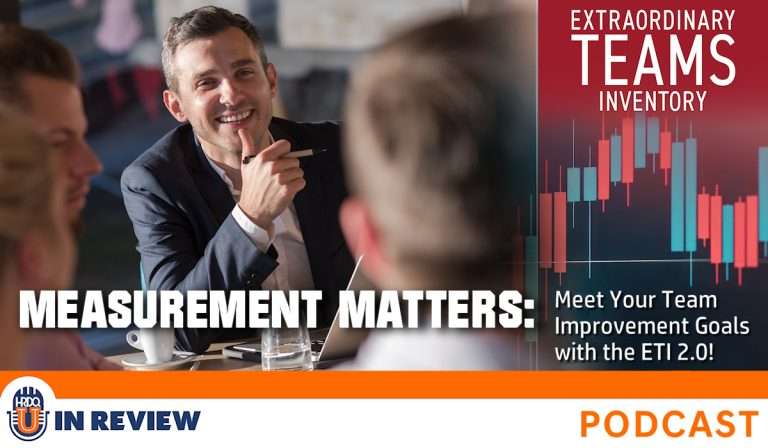
Listen to this podcast event at no charge with your
HRDQ-U Free Access Membership
We’re joined by Kevin Coray and Sally Stamp to dive deeper into our recent webinar, Measurement Matters: Meet Your Team Improvement Goals with the ETI 2.0!
If you’re looking for a way to assess, measure, and enhance your team’s effectiveness, this episode is for you! We’ll break down
Resources and Links:
Watch the webinar: Measurement Matters: Meet Your Team Improvement Goals with the ETI 2.0!
Learn more about the product: Extraordinary Teams Inventory 2.0
Get Certified: ETI Certification
Check out the related blog post: “Elevate Your Team with the ETI: A Team Performance Assessment“
[ PODCAST PLAYBACK ]
You must be signed-in with your membership account to access this content.
Enjoyed this podcast? Have suggestions on how we can improve? Please take our quick survey and receive a coupon for 15% OFF any of our individual membership plans.
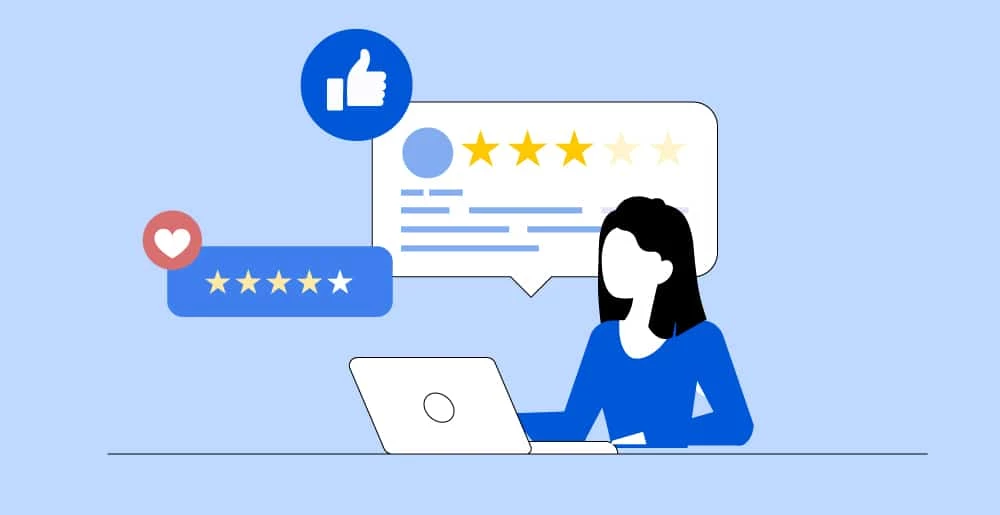
*Instant 15% coupon available upon completion of survey.
Want to learn more? Become an Individual or Corporate member to watch this and hundreds more webinars!
Discover effective strategies to set and achieve team improvement goals. Take your team to new heights with these proven techniques from the ETI 2.0.
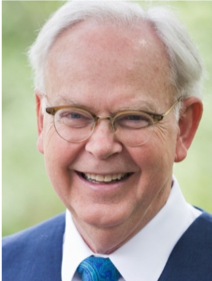
Kevin Coray, Ph.D.
Kevin Coray is an industrial and organizational psychologist, a consultant, and a master somatic coach for leaders, teams, and organizations. He co-authored the Extraordinary Teams Inventory and the Embodied Leadership Assessment. With over 35 years of experience, Kevin has consulted and coached executives and teams, enhancing organizational performance. He led an award-winning national consulting firm for 27 years. His work is based on appreciative inquiry, research on extraordinary teams, and somatic coaching training.
He has expertise in program evaluation, strategic planning, and core business redesign. His public-sector clients include various U.S. Departments (Health and Human Services, Education, Homeland Security, National Institutes of Health, Army, Defense, Interior, Transportation, Agriculture), the Architect of the Capitol, and the International Trade Commission. He has also worked with state and local governments. His NGO clients include GM, IEEE Computer Society, Society for Petroleum Engineers, Optica, Meals on Wheels Association of America, AGE Africa, the ARC of Northern Virginia, NY HIV Planning Council, Fuller Project for International Reporting, Hudson Valley Community Services, the Dream Project, the International Council for Veterinary Assessment, and VetPartners.
Kevin has taught management and psychology at George Washington University, Clarkson University, and the University of Baltimore.
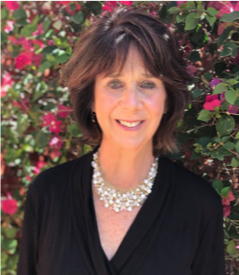
Sally Stamp, MC, BCC
Sally Starbuck Stamp is a Board-certified coach and consultant who works with individuals, teams, and organizations primarily in the areas of leadership development, communication effectiveness, and cultural transformation. Her experience includes work for a variety of healthcare and technical organizations as both an internal change agent and external coach and advisor.
Sally utilizes a strengths-based approach to work and life that allows individuals, teams, and organizations to optimize their positivity and potential. Her work is characterized by collaboration and co-creation with her clients. She is committed to developing client relationships that encourage personal growth and development in an environment of safety and trust.
Sally is a founding member of the Extraordinary Teams Partnership. She incorporates the Extraordinary Groups research into her work with teams to help make the teaming experience more positive and more productive. Sally is a co-author of the ETI 2.0.
Sally holds a master’s in counseling from Arizona State University and undergraduate degrees in Sociology and Psychology from Denison University and Nursing from Kent State University. She is a Board Certified Coach with additional training in Team Coaching. Sally is a frequent presenter at conferences and has been a regular contributor to Veterinary Team Brief, where she co-authored a year-long series on Positivity in the Workplace.

Training Tools for Developing Great People Skills
This event is sponsored by HRDQ. For 45 years HRDQ has provided research-based, off-the-shelf soft-skills training resources for classroom, virtual, and online training. From assessments and workshops to experiential hands-on games, HRDQ helps organizations improve performance, increase job satisfaction, and more.
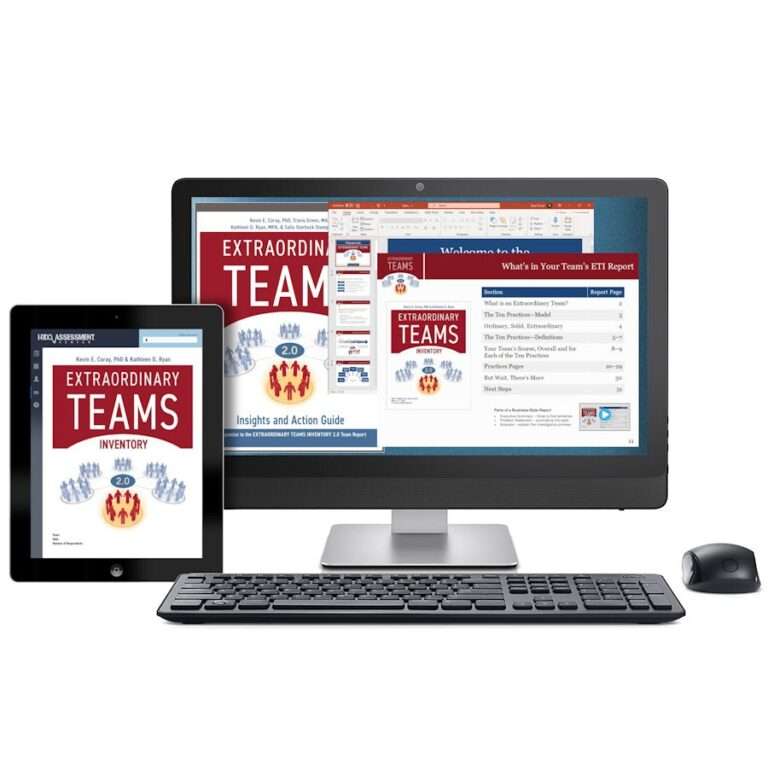
Extraordinary Teams Inventory 2.0
Extraordinary teams cultivate a vibrant and collaborative environment built on trust, respect, and active participation. The Extraordinary Teams Inventory 2.0 provides a powerful, research-supported approach that takes your organization’s teams from mediocre to outstanding, resulting in remarkable success.
Buy at HRDQstore.com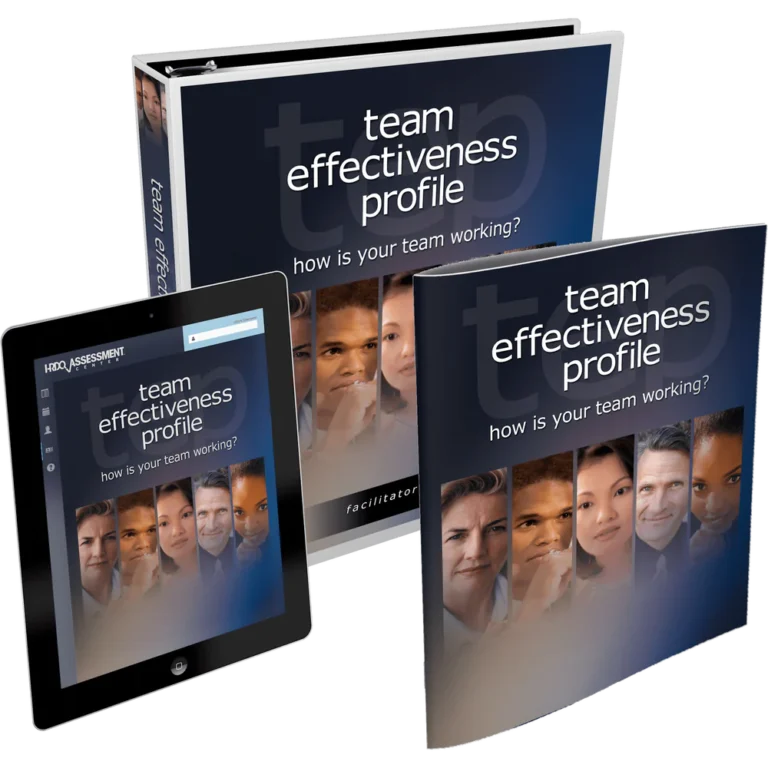
Team Effectiveness Profile
This workshop and assessment aim to boost group productivity and overall satisfaction. Frequently, unnoticed issues can obstruct a team’s effectiveness, siphoning off energy and impeding progress. The Team Effectiveness Profile aids in pinpointing and tackling these obstacles, enabling teams to realize their full potential and reach their objectives.
Buy at HRDQstore.comThe HRDQ-U In Review Podcast, brought to you by HRDQU.com, brings you the latest insights and practical tools for enhancing soft-skills training in your organization. As a learning community for trainers, coaches, consultants, managers, and anyone passionate about performance improvement, we interview subject matter experts and thought leaders from recent webinars they presented with us to take a deeper dive into the content they shared and answer all your questions. Join us as we explore new ideas and industry trends, share success stories, and discuss challenges faced by professionals.
The HRDQ-U In Review Podcast is intended for HR and training professionals, organizational development practitioners, and anyone interested in improving workplace performance and productivity.
New episodes of HRDQ-U In Review are released every week.
The length of the episodes varies, but they typically range from 15-30 minutes.
The podcast covers a wide range of topics related to HR and organizational development, including leadership development, team building, communication skills, conflict resolution, employee engagement, and more.
No, HRDQ-U In Review is completely free to listen to.
You can listen to any available HRDQ-U In Review Podcast right on our website at HRDQU.com via our embedded Spotify player on the related webinar page. In addition to our self-hosted option, you can find the HRDQ-U In Review Podcast on many of the popular streaming services, which are listed above.